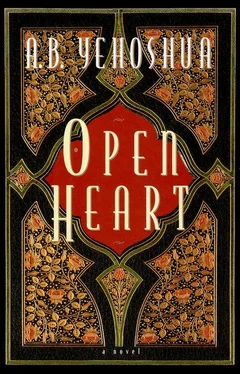A. Yehoshua - Open Heart
Здесь есть возможность читать онлайн «A. Yehoshua - Open Heart» весь текст электронной книги совершенно бесплатно (целиком полную версию без сокращений). В некоторых случаях можно слушать аудио, скачать через торрент в формате fb2 и присутствует краткое содержание. Год выпуска: 2014, Издательство: Peter Halban, Жанр: Современная проза, на английском языке. Описание произведения, (предисловие) а так же отзывы посетителей доступны на портале библиотеки ЛибКат.
- Название:Open Heart
- Автор:
- Издательство:Peter Halban
- Жанр:
- Год:2014
- ISBN:нет данных
- Рейтинг книги:3 / 5. Голосов: 1
-
Избранное:Добавить в избранное
- Отзывы:
-
Ваша оценка:
- 60
- 1
- 2
- 3
- 4
- 5
Open Heart: краткое содержание, описание и аннотация
Предлагаем к чтению аннотацию, описание, краткое содержание или предисловие (зависит от того, что написал сам автор книги «Open Heart»). Если вы не нашли необходимую информацию о книге — напишите в комментариях, мы постараемся отыскать её.
Open Heart — читать онлайн бесплатно полную книгу (весь текст) целиком
Ниже представлен текст книги, разбитый по страницам. Система сохранения места последней прочитанной страницы, позволяет с удобством читать онлайн бесплатно книгу «Open Heart», без необходимости каждый раз заново искать на чём Вы остановились. Поставьте закладку, и сможете в любой момент перейти на страницу, на которой закончили чтение.
Интервал:
Закладка:
When I finally found a phone, I was too tired to engage Amnon in any of my theories and simply asked him to notify the phone company of the problem, and gave him my new number, which I had written down on my identity card. And then, in spite of the lateness of the hour, I phoned my parents, who I thought would be worrying about my sudden disappearance, but it turned out that they were sleeping soundly, without a care in the world, for when they had phoned my new apartment in the afternoon, a recorded voice had informed them that the phone was temporarily disconnected.
“It must be my new landlady’s fault,” I said immediately, laughing but annoyed. “Instead of asking for a simple reading of the meter, she must have confused the issue somehow, and they disconnected the phone. Terrific. Now what am I going to do?” But my mother calmed me down; she had an inexplicable faith in government agencies, perhaps because my father worked for one of them. “They’ll connect it again in the morning, and in any case we won’t need it tomorrow, because we’re coming to Tel Aviv to sign the guarantee for you and help you organize things in your new place.” Suddenly I felt uncomfortable about their coming so soon to my new apartment, where my lovemaking with my landlady still lingered in the air. I was also sure that my mother wouldn’t approve of the apartment, which she had been hostile toward from the outset. And even if she restrained herself and didn’t say anything against it, she wouldn’t be able to resist questioning me about my real reasons for making this sudden change. “No, don’t come tomorrow,” I said quickly. “The guarantee can wait. I’ve given her enough postdated checks. Don’t come, I won’t have enough time to spend with you tomorrow. And tomorrow night I’m taking part in a private operation with Dr. Nakash, who’s taken me on as his assistant, and I’ll have to go in early to check out the anesthetizing equipment and begin to learn the subject. Why come in the middle of all the mess? Give me a chance to fix things up a bit. Besides, it makes more sense for me to come to Jerusalem on Friday to see you, and I’ll bring the guarantee with me so you can sign it there.” I concluded on a pleading note, and now there was a silence on the other end of the line. There was no doubt that they were disappointed, especially my father, who had probably planned the visit to Tel Aviv in detail. But my promise to come to Jerusalem for the weekend tipped the scales, and they gave in. “So tomorrow you’ll be operating again,” said my father, suddenly coming to life. “You see, nothing’s been lost. They want you in the operating room again.”
“It’s only an operation for the surgeon, Dad. For me it’s just putting someone to sleep and waking him up again,” I said in despair, looking at a young woman wrapped in a winter coat, standing a few steps away in the empty street.
I said nothing to them about my interview with Professor Levine, not wanting to cause them any more grief. I would have to accustom them gradually to the idea that I was out of the hospital. I hurried back to the apartment, and although I had had a difficult, confusing day, I didn’t feel tired and immediately began to tackle the task of arranging my possessions in their new places. It turned out that in addition to the granny’s closet, the Lazars had forgotten to empty the two little bedside cupboards, which contained mainly documents, old letters, and photograph albums. At first I didn’t know if I had the right to empty them on my own initiative, but the thought of having two family archives stuffed with letters and photographs and documents belonging to complete strangers weighing on my sleep at night was too much for me. After some hesitation, I decided to cram everything into some empty shoe boxes I found on the balcony, which I pushed between the gray suits in the granny’s closet. At first I thought of keeping one photograph album out, for on paging through it I had found a number of ancient photographs of Dori as a young soldier, a law student, with Lazar and without him, holding a baby in her arms, always smiling, attractive and shapely, a young woman of my own age. But in the end I put it away with the others. I felt alien and hostile toward these photographs. I couldn’t connect with her past; nothing here belonged to me, nor did I need it to fire my imagination and fuel my love. I wanted her the way I knew her now, plump, middle-aged, mature, pampered but sure of herself. Until the small hours of the night I was busy putting my things away and cleaning the apartment. I hung my pictures up on the nails which had remained in the walls, not wanting to disturb the silence with the banging of a hammer. Finally I took a shower and made the bed with the clean, fragrant sheets that had apparently been left for my use, and with the disconnected telephone ensuring that no one would disturb me, I sank into a deep, prolonged sleep, with the result that I arrived alert and clearheaded at the private hospital on the Herzliah beach for the operation which began at twilight the next day and lasted until dawn.
It was complicated and dangerous brain surgery, performed by a surgeon of about thirty-five, a visiting professor from America, assisted by a local man, a well-known retired surgeon from our own hospital, who had worked with Dr. Nakash in the past and presumably trusted him to handle the particularly complex anesthesia procedure. For the first time I saw Nakash losing a little of his natural serenity and inner confidence. He was flushed and excited, and after introducing me to the visiting surgeon and his personal assistant, he began addressing me in English, and asked me to answer him in kind, so that we would fit into the linguistic ambience of the place, which from the moment of my arrival had impressed me with its pleasantness. In contrast to the operating rooms I had known up to then, which were always cold, windowless, isolated from the world, buried in the heart of the hospital like the engine room of a submarine, here we entered an operating room that was bright and cozy, behind whose attractive drapes were windows through which an almost pastoral view was visible, with people walking calmly along a well-tended seaside promenade. The instruments were newer than those in our hospital, smaller in their dimensions, light and pleasant to hold. And in the middle of all this was the large shaved skull of a handsome, sturdy man of about fifty-five. Since the days of my anatomy lessons I had not seen a human skull held between forceps and gradually opened up, layer after layer, sawed by the hand of an artist to expose the whitish brain pulsing with its minute capillaries, whose delicate balance between stillness and vitality Nakash was controlling from behind a state-of-the-art anesthesia machine full of little monitors displaying changing numbers. And so the long night began, during the course of which I learned how to stand rooted to the spot for hours at a time in order to follow the movement of the respirator, and especially the changing values of the oxygen concentration, the level of expired carbon dioxide, the volume of air pumped into the lungs, and of course the heartbeats, the systemic blood pressure, the venous pressure, and the state of hydration in the body — all of which make up the drama of anesthesiology, particularly in brain surgery, where the slightest twitch or cough on the part of the patient can cause the exposed brain to bulge.
“If you’re getting bored,” Nakash whispered to me in the middle of the night in his heavily accented Iraqi Hebrew, “think of yourself as the pilot of the soul, who has to ensure that it glides painlessly through the void of sleep without being jolted or shocked, without falling. But also to make sure that it doesn’t soar too high and slip inadvertently into the next world.” I had heard him speak like this about his role before, but now, in the depths of the night, a little groggy after long hours of intent concentration on the changing monitors of the anesthesia machine, with the skull and brain not actually before my eyes but only flickering grayly on the suspended video screen, I felt that his words were true. I had turned from a doctor into a pilot or a navigator, surrounded by nurses, who looked like well-groomed stewardesses in this private hospital, coming in every now and then to draw a little blood to measure the potassium and sodium levels, or to pour cocktails of pentothal or morphine into the suspended infusion bags, with special additions concocted by Nakash to ensure the tranquillity of the “instrument flight.” And for the first time I saw this work, for all its boredom and frustration, as something that possessed spiritual significance, for the thought and attention of the anesthetist were addressed not to the body, not to the matter, not to the greenish tumor which the two surgeons at our side were battling to extract from the depths of the brain, but to the soul, which I suddenly felt was truly in my hands, in its silence and, who knows, perhaps also in its dreams.
Читать дальшеИнтервал:
Закладка:
Похожие книги на «Open Heart»
Представляем Вашему вниманию похожие книги на «Open Heart» списком для выбора. Мы отобрали схожую по названию и смыслу литературу в надежде предоставить читателям больше вариантов отыскать новые, интересные, ещё непрочитанные произведения.
Обсуждение, отзывы о книге «Open Heart» и просто собственные мнения читателей. Оставьте ваши комментарии, напишите, что Вы думаете о произведении, его смысле или главных героях. Укажите что конкретно понравилось, а что нет, и почему Вы так считаете.












